Table of Contents
Adverbs of time are important because they show when something happens. They help make sentences clear by telling if an event happened in the past, will happen in the future, or happens often.
Learning to use adverbs of time will make your sentences clearer and improve your communication.
What Are Adverbs of Time?
Adverbs of time show when, how often, or how long something happens. They help make sentences clear by answering “When?” and giving a clear sense of time.
Examples:
She will arrive tomorrow.
He visits his grandparents every weekend.
They have lived here for two years.
Position of Adverbs of Time
Adverbs of time can appear at different points in a sentence, depending on what you want to emphasize:
1. At the beginning of a sentence:
- Tomorrow, we will have a meeting.
- Yesterday, I went shopping.
- Next week, we’ll start the project.
- Soon, she will arrive.
2. In the middle of a sentence:
- She has already finished her lunch.
- They are always on time.
- She will eventually understand.
3. At the end of a sentence:
- We met last night.
- We had dinner earlier.
- He called me yesterday.
- I’ll see you tomorrow.
Types of Adverbs of Time
Adverbs of time can be divided into three main types: Definite Time, Indefinite Time, and Frequency.
1. Definite Time
Adverbs of definite time refer to a specific time when something happens. These adverbs answer the question of exactly when the action takes place. Examples of definite time adverbs include:
- Today
- Yesterday
- Tomorrow
- Last week
- Next month
Example sentences:
- I will meet you tomorrow.
- He went there yesterday.
- she will come to attend the next month.
- He went to the school last week.
2. Indefinite Time
Indefinite time adverbs do not specify an exact time but still give a general sense of when something happens. They answer the question of when, but in a less clear way.
- Soon
- Later
- Eventually
- Sometime
- Recently
Example sentences:
- She will come later.
- I will call you soon.
- We can discuss it later.
- She eventually agreed to the plan.
- Let’s meet sometime next week.
- I recently visited my grandparents.
3. Frequency
Frequency adverbs describe how often an action occurs. These adverbs answer questions like “How frequently does this happen?” Examples of frequency adverbs include:
- Always
- Often
- Sometimes
- Rarely
- Never
Example sentences:
- He always wakes up early.
- I often read before bed.
- We sometimes go for a walk after dinner.
- He rarely eats fast food.
- I never miss a workout.
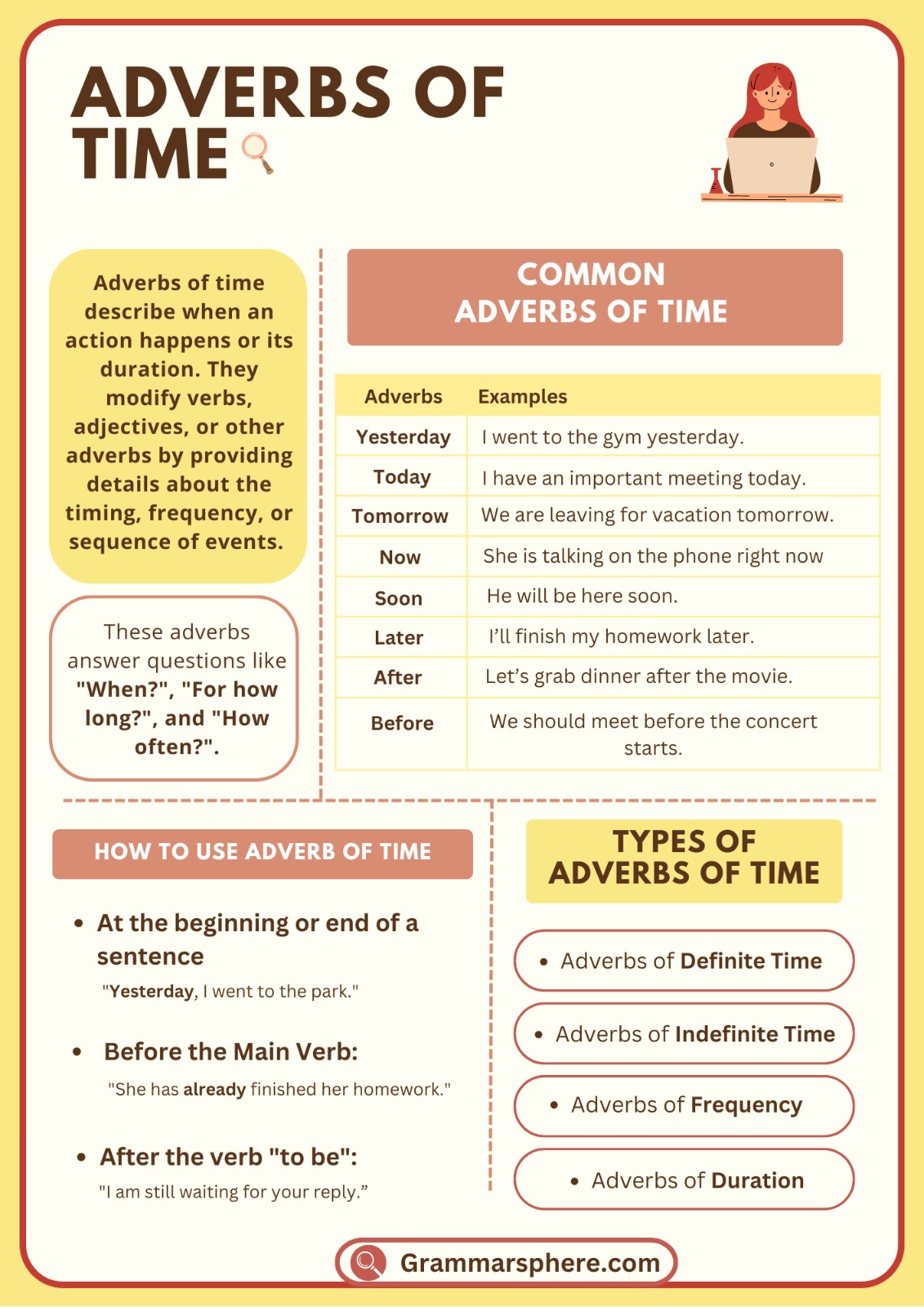
List of Common Adverbs of Time
Here is a list of commonly used adverbs of time:
- Now
- Then
- Today
- Yesterday
- Tomorrow
- Already
- Just
- Yet
- Recently
- Soon
- Later
- Eventually
- Sometime
- Before
- After
- Early
- Late
- Tonight
- Last week
- Nextmonth
- Often
- Sometimes
- Rarely
- Always
- Never
- Frequently
- Daily
- Weekly
- Monthly
- Annually
- Constantly
- Immediately
- Once
- Twice
- Soon
- after
- Suddenly
- Earlier
- Formerly
- Lately
- Long ago
- In the past
- Nowadays
- Since
- Ever
- In the future
- Shortly
- All day
- All night
- This morning
- By now
- For now
Adverbs of Time Example Sentences
- I will call you later.
- She visited me yesterday.
- We will meet tomorrow.
- He is coming soon.
- I have already finished the task.
- They left early this morning.
- She arrived late for the meeting.
- I will see you tonight.
- He never forgets my birthday.
- They often travel on weekends.
- I recently bought a new phone.
- We sometimes go hiking.
- He rarely eats dessert.
- The package will arrive shortly.
- I haven’t seen him lately.
Common Mistakes with Adverbs of Time
- Incorrect placement of the adverb:
Placing the adverb of time in the wrong part of the sentence can make it sound awkward or unclear.
✗ He often eats fast food never.
✓ He never eats fast food.
- Using the wrong adverb for the context:
Learners sometimes mix up adverbs of time, using an adverb that doesn’t match the time frame they want to express.
✗ She will come already.
✓ She has already come.
- Double adverbs of time in one sentence:
Using two adverbs of time together in a single sentence is usually unnecessary and makes the sentence sound cluttered.
✗ She visited me yesterday last night.
✓ She visited me last night.
- Overusing adverbs of time:
Repeating adverbs of time in every sentence can make your speech or writing sound repetitive and unnatural.
✗ I often go to the gym. I often meet my friends. I often eat out.
✓ I often go to the gym, meet my friends, and eat out.
FAQS
What is the adverb of time with examples?
An adverb of time tells when something happens. Examples: today, yesterday, soon, now, always, often.
What are the 25 adverbs of time?
Here are 25 adverbs of time: now, then, today, yesterday, tomorrow, soon, later, early, late, before, after, already, yet, still, just, recently, lately, always, often, sometimes, rarely, never, frequently, annually, daily.
How to teach adverbs of time?
Teach adverbs of time by explaining when actions happen. Use simple examples, ask “When?” questions, and practice with sentences.
You May Also Like

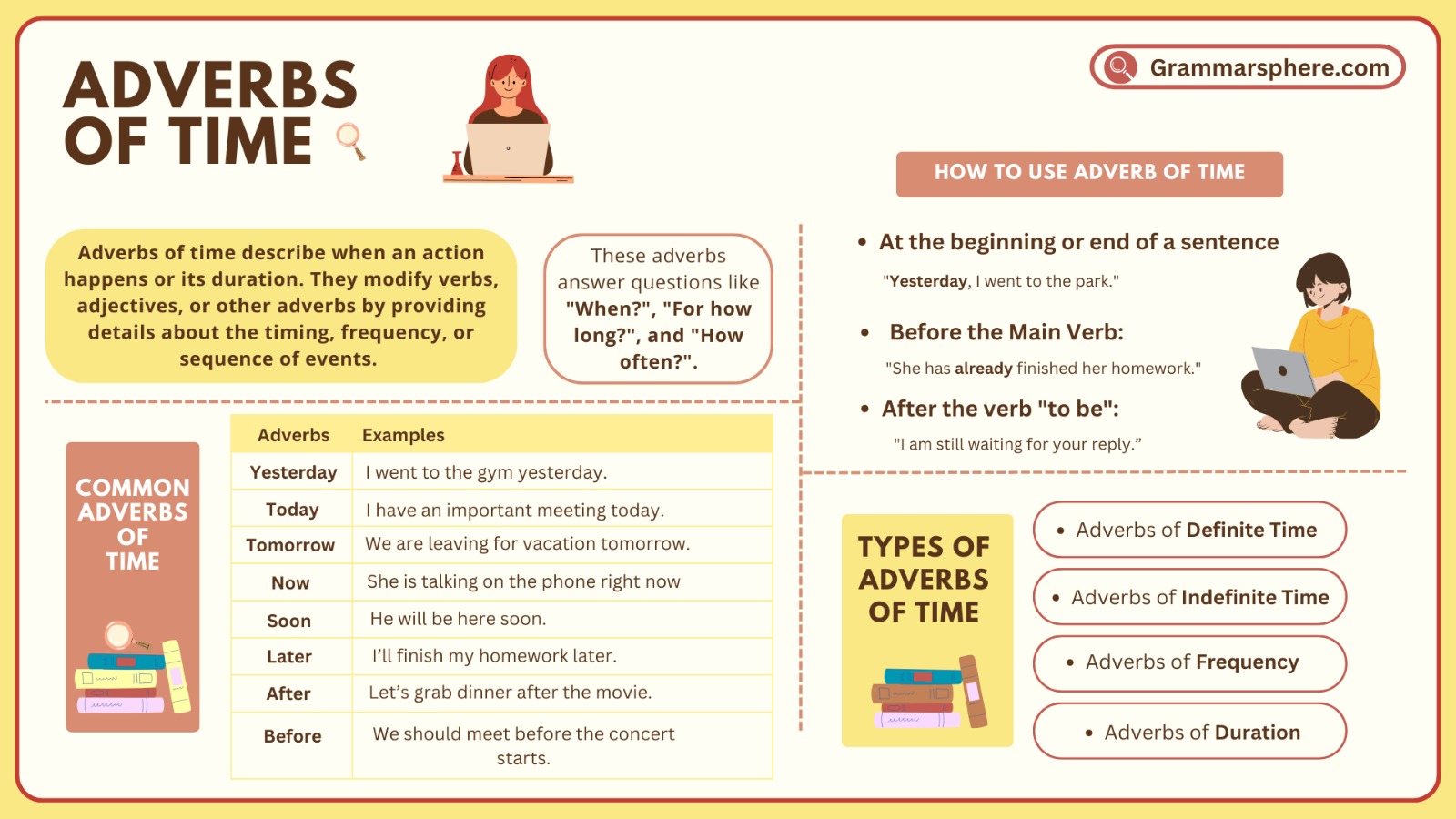
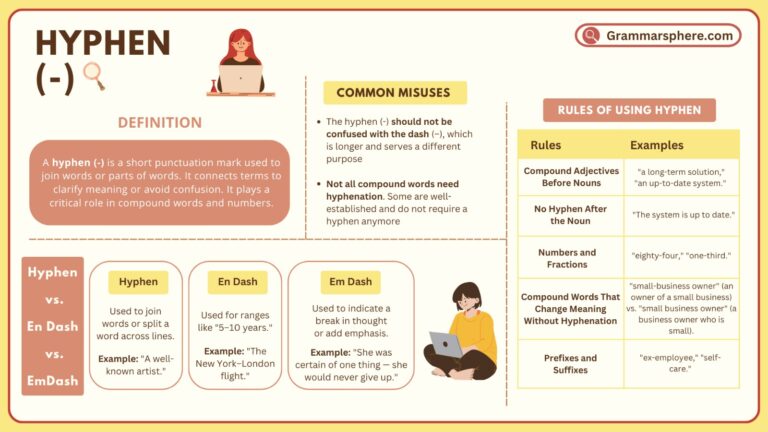
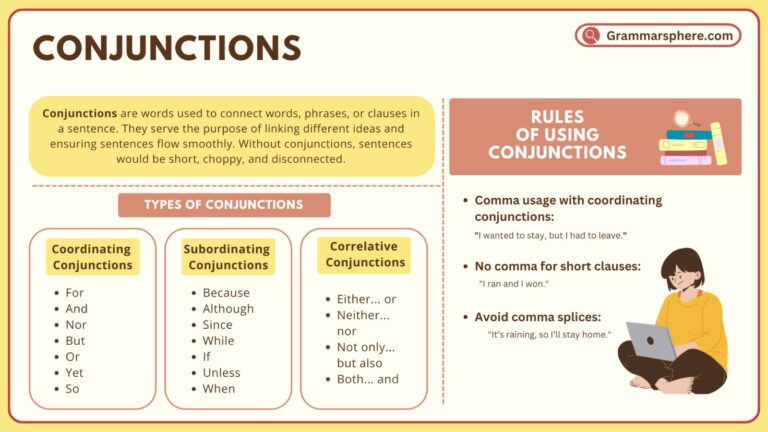
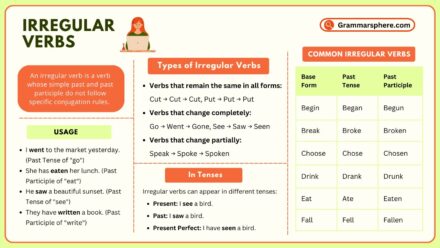

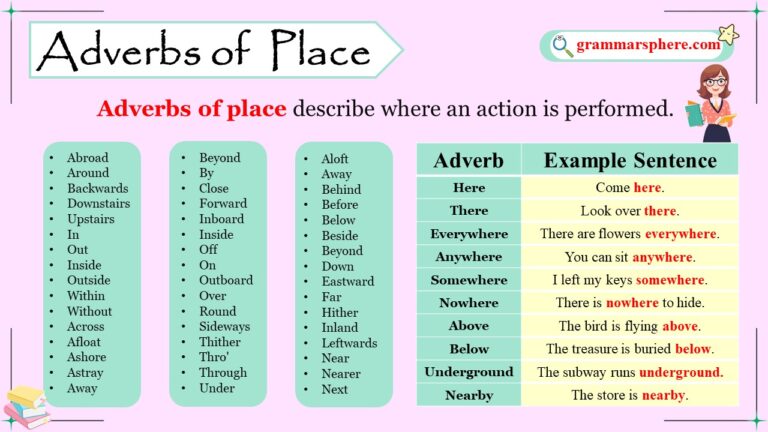
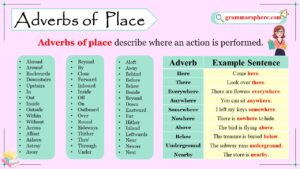


Leave a Comment